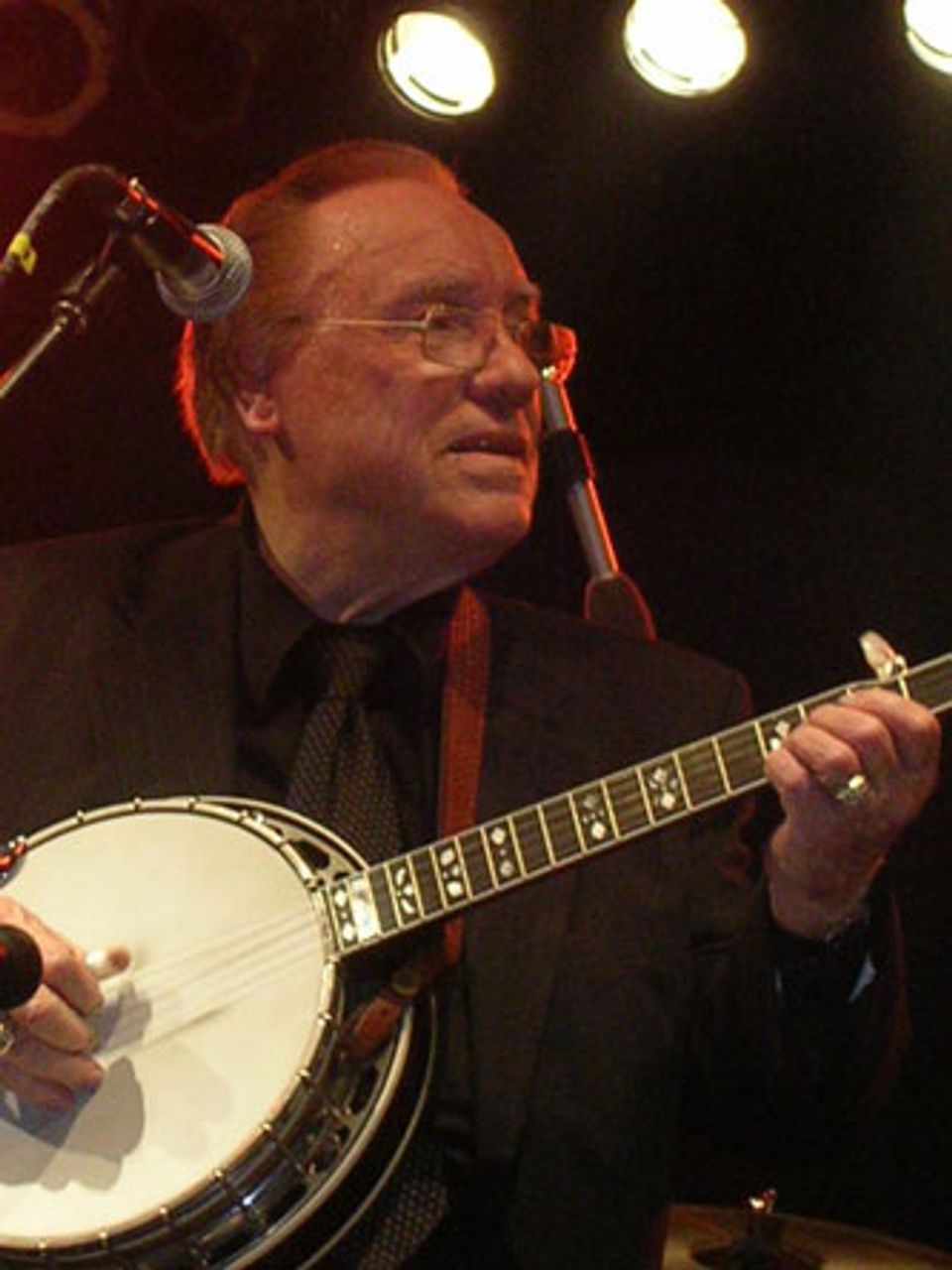Legendary Bluegrass musician Earl Scruggs died March 28 at the age of 88. Scruggs was an iconic banjo player who developed the three-finger rolling technique that became the defining sound of Bluegrass music. The recordings Scruggs made with Bill Monroe in the 1940s and with his long time collaborator Lester Flatt in the 1950s both shaped the genre and stand out among the finest work it has produced.
 Scruggs in 2005 [Photo: Rivers Langley]
Scruggs in 2005 [Photo: Rivers Langley]Scruggs was born January 6, 1924 in Shelby, North Carolina and grew up in a community called Flint Hill, which would later provide the name for one of his best known songs, “Flint Hill Special.” Scruggs was raised in a highly musical family. His father, a farmer, played banjo as did many of his brothers and sisters. Scruggs himself began playing the instrument around the age of four.
By the late 1930s, Scruggs had made his first attempts at becoming a professional musician. He joined a local group called the Morris Brothers, but was soon forced to quit, taking work at a local textile mill to help support his widowed mother. His life as a professional musician would not really begin until the end of World War II.
The Carolinas provided a rich musical environment during this period. Scruggs was influenced by a number of musicians in the area, both amateur and professional, including Snuffy Jenkins (1908-1990), who had begun to move away from the old-time “clawhammer” or “frailing” style of banjo in which the strings were strummed or rapped with the backs of the player’s fingernails. These new players utilized a freer, more syncopated finger-picking style. Scruggs surpassed them all, developing his own three-finger, virtuoso technique that would set the bar for all the players who came after him.
Scruggs’ big break in music came when he was hired by Bill Monroe, the “Father of Bluegrass,” in late 1945. Bluegrass music, which emerged and developed in the postwar period, was an energetic new style of folk music characterized by fast tempos and instrumental virtuosity, along with close harmony singing with soaring tenor vocalists taking the lead. The music seemed an almost cathartic release for the musicians who had finally put the Great Depression and the war years behind them.
Scruggs revitalized Monroe’s band the Blue Grass Boys, a group which also included the talented singer and guitarist Lester Flatt. Prior to Scruggs’ recruitment, David “Stringbean” Akeman had been the group’s banjo player. While a talented performer, Akeman played banjo in the old style and Monroe’s new musical experiments demanded something different. Scruggs’ new style of playing was the missing piece of the puzzle.
After a few years with Monroe’s group, Flatt and Scruggs left in 1948 to form their own band, the Foggy Mountain Boys. Their 1949 recording “Foggy Mountain Breakdown,” remains their best-known song. With its distinctive melodic pattern played by Scruggs sliding his fingers into the notes and the surprising E minor chord in the opening theme, the song has become a kind of Bluegrass standard. The hurried, forward momentum of the song is exhilarating. [One version: http://www.youtube.com/watch?v=QIKdswTJ2vY]
The best work of Flatt and Scruggs, including the songs “Roll in My Sweet Baby’s Arms,” “Pike County Breakdown,” “Jimmie Brown the News Boy,” “Salty Dog Blues,” “Doin’ My Time,” “Down the Road” and “Earl’s Breakdown,” are essential listening and would provide an ideal introduction for listeners approaching Bluegrass music for the first time.
While their best music was undoubtedly recorded from the late 1940s through the 1950s, Flatt and Scruggs gained even wider recognition in the1960s with their inescapable “Ballad of Jed Clampett,” the theme song to The Beverly Hillbillies television show. Their music was also featured prominently in Arthur Penn’s 1967 film Bonnie and Clyde.
During this time the musically adventurous Scruggs embraced the up and coming musicians and new sounds in folk and rock music, often to the chagrin of the more traditional Flatt. At Scruggs’ urging, the duo began to expand their repertoire to include music from more contemporary songwriters, including Bob Dylan, John Hartford and Tim Hardin. Tensions over the group’s musical direction eventually led to its break-up in 1969.
That same year, Scruggs performed “Foggy Mountain Breakdown” at the October 15 Moratorium to End the War in Vietnam demonstration held in Washington, DC. In an interview filmed at the demonstration, Scruggs said “I think the people in the South is just as concerned as the people that’s walkin’ the streets here today ... I’m sincere about bringing our boys back home. I’m disgusted and in sorrow about the boys we’ve lost over there. And if I could see a good reason to continue, I wouldn’t be here today.”
In the 1970s Scruggs formed a new group, the Earl Scruggs Revue, which included his sons Randy and Gary, and which mixed in elements of rock and blues music along with country and bluegrass.
Scruggs continued to record and perform into the last decade. Among his more notable recent recordings was the 2003 album Three Pickers, a collaboration with Ricky Scaggs and guitar great Doc Watson.
The news of Scruggs’ death on March 28 has been met with an outpouring of generous tributes from his fellow musicians. The warmth with which so many have spoken of the Bluegrass innovator is a testament to the enormous influence and inspiration his music has given to musicians and listeners all over the world. His passing at the age of 88 is a deeply felt loss.
